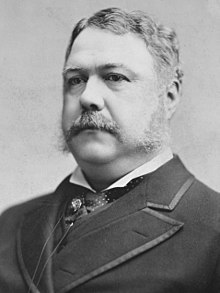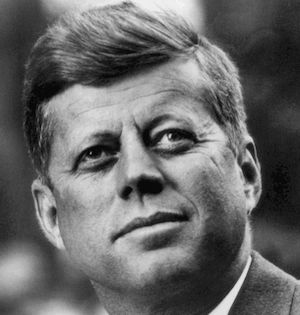How Many Presidents Have Lied About Their Medical History?
Related Link A Candidate’s Health Can No Longer Be a Secret (NYT) By Rick Shenkman
Remember when Dr. Harold Bornstein, Donald Trump's eccentric long-haired physician, released a letter predicting that Trump would be the healthiest individual ever elected president? CNN reported this week that Bornstein didn't write it. Trump did. Another Trump deception? It looks that way. But in this one regard Trump has plenty of company. Presidents have told more lies about their health than any other subject.

James Garfield in his sickbed (1881)
Until 1881 the medical condition of American presidents was considered an unfit subject for the public press. Thus, in 1824 the public was not informed of the serious stroke suffered by presidential candidate William Crawford, though the stroke had left Crawford nearly incapacitated. Because presidents were not asked questions about their health, they did not feel compelled to lie about it.
All that changed in 1881 when a gunman fired at President James Garfield at Union Station in Washington, D.C. as Garfield was leaving for a summer trip to New Jersey. Public attention was riveted on the White House, while Garfield fought for his life.
For three long months Garfield hung on and as he did the nation became accustomed to daily bulletins about his medical condition. Alexander Graham Bell visited to try to locate the bullet through the use of a machine he'd invented. The newspapers published an illustration showing the president laying half-naked on a table, Bell hovering over him. Newspaper sales soared. Never again would presidents be safe from the intruding questions of busy-body reporters.
Presidents Whose Medical History Was Concealed

Chester Arthur succeeded James Garfield as president in the fall of 1881. He became the first president to lie about his health. Within a year he began feeling ill. A doctor diagnosed him with Bright's disease, a kidney disorder. His last two years he was frequently confined to bed. To ease his pain he took trips to warm climates. On one trip to Florida he nearly died. When he was asked by reporters about his health he insisted he was in tiptop shape.

Grover Cleveland, as his second term began, complained that the inside of his mouth felt odd. A doctor discovered he had cancer. Over the July 4th holiday Cleveland underwent an operation to remove the upper part of his jaw. Overweight and ill, he was operated on in secret aboard a yacht off the New York coastline. His doctors worried their overweight patient could die. A rubber plate was inserted in his jaw to replace the cancerous bone that had been removed. Cleveland recovered that summer at his vacation home near Cape Cod. When reporters asked about his medical condition, he sent out an official to lie.

Woodrow Wilson suffered two strokes in the 1890s, more than a decade before he became president. He never revealed this to the public. Toward the end of his second term he was incapacitated by a series of strokes suffered while he was undertaking a national campaign on behalf of the passage of the Treaty of Versailles, which he had personally negotiated during an extended stay in Europe. Wilson was confined to bed for most of the rest of his term. His wife reportedly ran the government in his absence. When questions were raised about his health, she insisted he was conducting affairs as always.

Franklin Delano Roosevelt revealed that he had suffered polio in the 1920s but never let the public know that he had failed to fully recover. To maintain the fiction that he had the use of his legs, photographers were forbidden to take his picture while he was getting in and out of automobiles. Rumors swirled around him in 1944 that he was unfit to serve a fourth term. To demonstrate his vigor in the campaign, he subjected himself to a tour of New York in an open car during a driving rain storm. He died in April 1945, shortly after being sworn in as president.

In 1949 Dwight Eisenhower complained of serious chest pain and was confined to a hospital bed in Florida for more than a month. Historians now believe he had suffered his first heart attack. Shortly after he took office as president he again suffered serious chest pains. His press secretary told the press that he had eaten something that disagreed with him. In fact, in all likelihood he had suffered a second heart attack. In 1955 he was on vacation in Denver when he suffered yet another heart attack. His doctor initially told the press that Ike had "digestive upset." Only after it was obvious that the president had suffered massive cardiac arrest was the truth revealed.

Though our youngest elected president, John Kennedy only appeared to be in perfect medical health. He actually suffered from multiple ailments including Addison's disease. Lyndon Johnson, his rival for the Democratic Party nomination in 1960, leaked to the media that JFK had Addison's, an often fatal disorder of the adrenal glands, but Kennedy's staff denied it. By the 1970s it was well known that Kennedy had in fact been gravely ill during his presidency. In 2002 historian Robert Dallek confirmed the rumors in a landmark biography.
|
HNN: The JFK Medical Files
|

At age 69 Ronald Reagan was the oldest elected president (until Donald Trump) and suffered the maladies common to older men. But his aides had little reason to buff up the horseback riding president's health history until the day in March 1981 when he was shot. Though they assured the public in the hours afterward that Reagan was making a full recovery, they failed to disclose how close he came to dying, according to biographer Edmund Morris, who noted that Reagan had lost a shocking amount of blood.